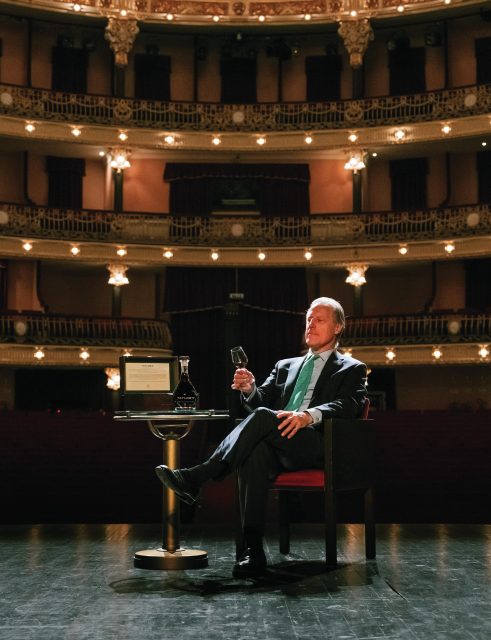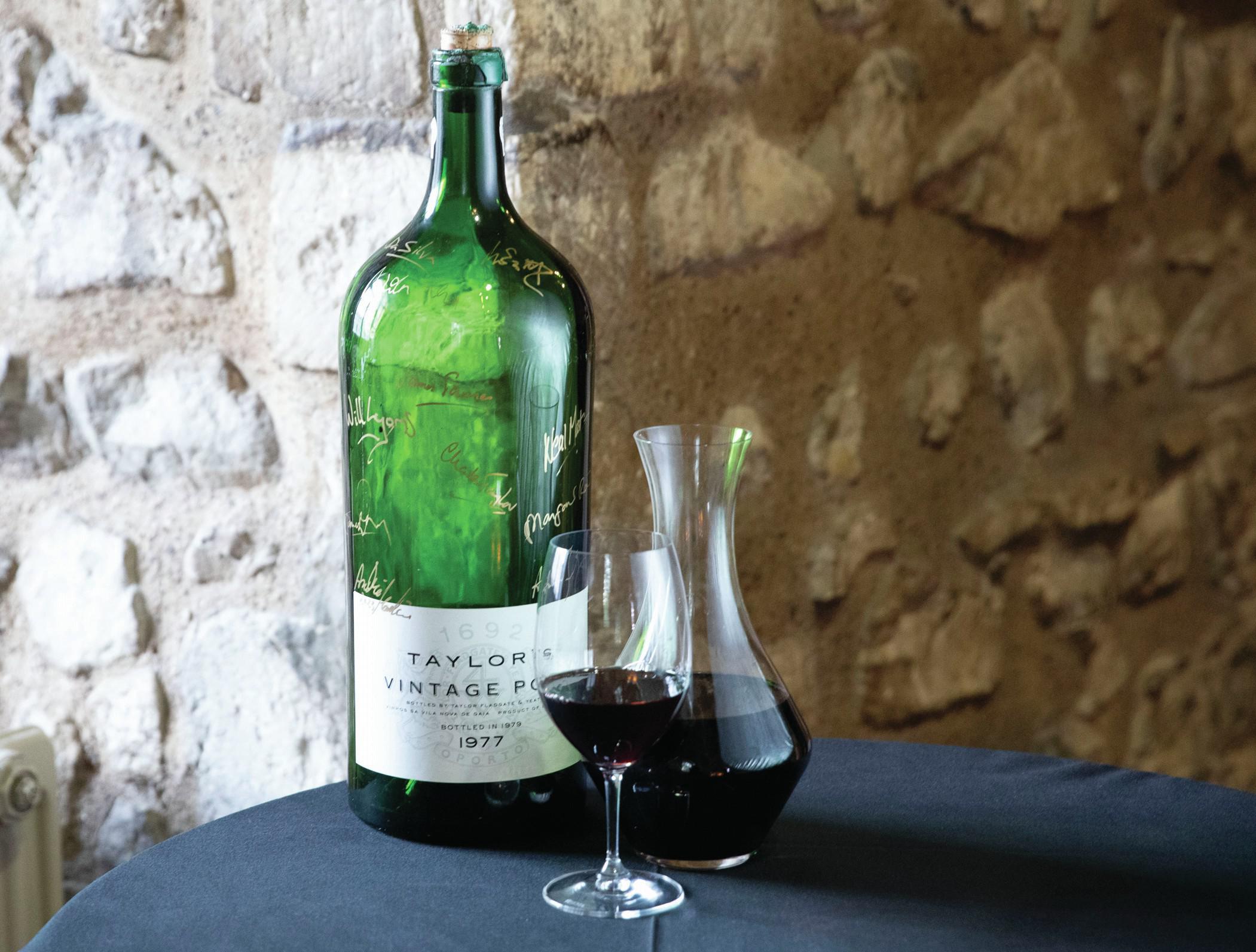The Big Interview: Adrian Bridge
By Sarah NeishThe CEO of The Fladgate Partnership on the power of art, green air conditioning, and the importance of finding the right distribution model.

There are times when one must graciously accept defeat. And while the drinks business reaching its 21st birthday in June called for much free-flowing Champagne, we couldn’t quite compete with the 650 years racked up by the Anglo-Portuguese alliance, a milestone that happened to be marked at around the same time as our own celebrations.
This continuous friendship between England and Portugal has underlined the Port business for almost as long, following the signing of the Anglo-Portuguese Treaty by King Edward III and King Fernando and Queen Leonor of Portugal on 16 June 1373 in St Paul’s Cathedral, London.
Speaking at a dinner held by Taylor’s Port at The Tower of London to mark the occasion, Adrian Bridge, CEO of The Fladgate Partnership, said: “We are proud to be a partner and the official Port for Portugal-UK 650, which commemorates the long and enduring friendship between our two countries.”
Bridge himself has played no small hand in steering this alliance for the past 29 years via his role at the helm of iconic Port brands Taylor’s, Croft, Fonseca, and Krohn. He has also done so through his considerable contributions to hospitality and tourism; his portfolio of luxury hotels having fortified Porto’s position as a world-class tourist destination, beckoning Brits to explore the winding, azulejo-studded streets, and snaking hills of this vibrant Portuguese city.
World of wine
Porto’s impressive World of Wine (WOW), which opened its doors in 2020, and cost more than £91 million to complete, funded partly by vintage stock of Fladgate Port, was also spearheaded by Bridge. A vast hub of gastronomy, visual arts and education, the centre has fast become, says Bridge, “the cultural district” of Porto, located in the heart of Vila Nova de Gaia.
New at WOW for this summer is ‘The Dynamic Eye’, a Tate Modern exhibition that opens on 3 July, transported to Porto by way of Shanghai.
“There are 100 pieces of work, including kinetic and 3D installations, from 60 different artists,” says Bridge, who is himself an avid fan of Wassily Kandinsky or ‘the father of modern art’.
“I love the fact that he had synaesthesia – he could hear his paintings,” Bridge has said previously. It is this total surrender to the senses that he wants visitors to feel upon stepping through the doors of WOW. And those visitor numbers are swiftly ramping up.
“The Port business has now fully recovered from Covid, and we saw 40% increases in visitors in 2022 across all our properties and locations,” Bridge tells db.
At the time of our conversation, Bridge is awaiting final sign-off on planning permission for his vision of transforming a collection of empty riverside Fonseca buildings into a premium hotel offering.
“There have been some last-minute complications of a political nature,” he says tactfully, which have delayed things. “But I think it will be possible to open in May 2025. We’re still going ahead with the project, as well as our expansion plans for our property in the Douro, but it’s not clear exactly when either of these will be open to trade.”
A royal affair
According to Bridge, The Fladgate Partnership saw no significant impact on Port sales following either the death of Queen Elizabeth II, nor the coronation of King Charles III. However, Taylor’s did release an 80-year-old Very Very Old Tawny Port (VVOP) for the Queen’s platinum jubilee in 2022, with Bridge saying: “It was important to mark the occasion with a proper sort of bottling.”
That “proper sort” was drawn from some of the oldest and rarest Ports maturing in Taylor’s cellars, hidden gems that had been ageing gracefully since before the Second World War. Only 2,000 bottles of the Jubilee VVOP were produced, carrying a price tag of £350 each, though a second release in September 2022 saw a further 3,000 bottles of Taylor’s VVOP descend upon fine wine merchants, retailing for £750. It was a considerable leap into the newly minted Very Very Old Port category, permitted by the Instituto dos Vinhos do Douro e Porto last year.
But while the heritage of the brands under Bridge’s wing has undoubtedly been a key factor in their success, he is equally keen to attract a new, younger generation of Port drinkers to the category via his trademarked Portonic (dry white Port and tonic in a can).
According to Bridge, launching Portonic during Covid was “a challenge”, and has “required extra work to keep it going”. However, in one particular market switching distributor was key to unlocking the product’s potential, with the company now on track to sell half a million cans in Brazil, “such is the power of the Heineken distribution model”, says Bridge.
Lessons have been learned concerning the best way to bring an RTD to market. “We’ve discovered that it can be more appropriate to use a local distributor rather than the typical fine wine distribution channel,” he says.
The idea behind Portonic is that convenience is king, with the can offering “a perfect serve every time.”
A slew of marketing activations during the past 12 months have seen the product placed in the hands of young, beautiful things during fashion weeks in Milan, Lisbon, and London, while revellers at Primavera Sound in Madrid and Barcelona danced all night to the likes of Dua Lipa and Gorillaz, Portonic firmly in hand thanks to a partnership with the festival.
Mention the looming 44% increase in the cost of duty in the UK, however, and dancing is the last thing on Bridge’s mind.
Due to come into force on 1 August, Bridge says: “We’re going to see the government effectively push through a record-breaking increase on Port duty, which is likely to result in bottles retailing for around £2.30 more than their current price. Ultimately, a bottle of Taylor’s LBV, instead of being a £15 product, will now be a £20 product.”
Whether this is likely to alienate those young consumers he is hoping to win over remains to be seen, especially at a time when the cost-of-living crisis already has its hooks firmly into Millennial and Gen Z disposable incomes.

Bridge and his wife, Natasha, at the Tower of London
On the topic of younger crowds, I ask Bridge whether he is aware of the so-called ‘Taylor Port Challenge’ that has blown up on TikTok, and he bristles at its mention.
The TikTok trend, which sees videos of young Americans thoroughly incapacitated after drinking copious amounts of Port, unaware of its higher ABV compared with table wine, has gone viral on the social media channel.
While Taylor Port is not affiliated with Fladgate’s Taylor’s Port – the former is an entirely separate brand and product based in New York – it must be frustrating to have the integrity of your own brand called into question by consumers who aren’t always aware of the difference.
“The problem we have,” says Bridge, “is that the American brand registered its trademark in the US in 1922. By the time we got there in 1924 to register our own trademark we were too late. We cannot control what the American brand, or American consumers do. Taylor Port is a very different proposition to our product. We own the trademark everywhere else in the world.”
As for the social media trend itself, Bridge concedes: “It’s the modern world, there’s not much we can do about it. Social media crosses borders and there is no regulatory environment in which we can contest it.”

Moving on from the US to Asia, and Bridge’s tone brightens considerably. “Clearly, a lot of the Asian markets are very strong right now. We’ll see a lot of change in those markets over the next year, especially in the context of the geopolitical changes happening there. I strongly believe that Asia is a very important market for fine wine. Wealth creation in Asia continues to be robust so there are lots of consumers there that want to buy fine wine,” he says.
“We’re seeing strong growth in South Korea, and in Taiwan. We have recently increased our visibility in the Philippines, and when I was in Singapore recently I was incredibly pleased to see how buoyant the market was there. People were very much out and spending again.”
The turning point for Fladgate’s business in Asia, says Bridge, will come in October, the gateway to the holiday season, starting with the Mid-Autumn festival, and leading up to Christmas.
He does, however, note that a large chunk of Fladgate’s Port sales in both the travel retail arena and luxury Asia hotels and restaurants “disappeared during lockdown”, adding “it will take a bit more time for those sectors to recover.”
Green air conditioning
The long-term sustainability of the business is never far from Bridge’s mind, whether that’s working to reduce bottle weight – “we’ve already lightweighted the Croft bottle to reduce our carbon footprint, and are in the process of lightweighting the Taylor’s bottle” – or pioneering green air conditioning in Fladgate’s hotels.
When The Bearsley is operational, it will be “the first carbon-neutral hotel in Portugal”, Bridge tells db.
This impressive feat will be achieved through implementing DC (direct current) rather than AC (automated current) air cooling functionality throughout the hotel, a move that Bridge estimates will slash the hotel’s electricity use by 40%.
“If you think of what your phone uses, that is DC energy,” he says. “You plug the phone into a charger for it to become AC. When you feel the device heat up, that heat is actually a loss of energy. So in a hotel context you can add a small transformer to convert the AC to DC, which generates a loss of heat, and means you don’t need to use a lot of energy to remove the warmth from a building.”
It’s not only electricity that keeps Fladgate’s brands running, with the wellbeing of its people fundamental to the business.
“We have a large workforce, which is increasingly diverse,” Bridge says. “In the city we provide a lot of accommodation for younger employees. We house 151 staff members, all within walking distance of the World of Wine, and subsidise nutritious food in the canteens. We make sure our team gets 50% of their daily calorific content via our canteens; salads and fruits are heavily subsidised to encourage a healthy, nutritious diet.”
How long has the company been doing this? “Forever, really. As a business leader I can set policy and strategy but I can’t do the work on the ground. I need people to feel we are looking after their needs. We’re a family business, and families have values.”
With db’s 21st birthday in mind, can Bridge recall how the 2002 vintage was for Port?
“We didn’t declare it,” recalls Bridge. “It was a slightly more austere year than the 2003, which was a bit more forward and fruit-driven. In 2002 we had purchased Croft, and invested in putting back the traditional lagares (granite treading tanks) at Quinta da Roêda in the Douro Valley, which marked an important return to foot-treading for us.”
2002 has also been described as an excellent year for those who picked their grapes before the rains; less so for those who didn’t, something that may also prove true of Portugal’s latest harvest, which Bridge says “should be bountiful, as we’ve had a lot of rain this year”.
Related news
ProWine and db Asia partner on the inaugural Asia Green Awards
